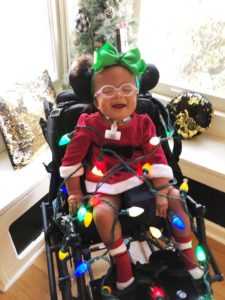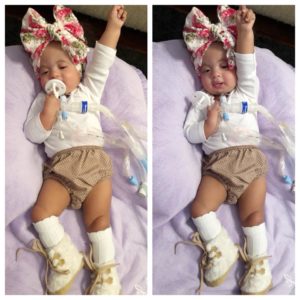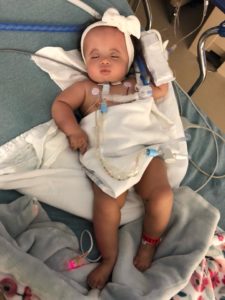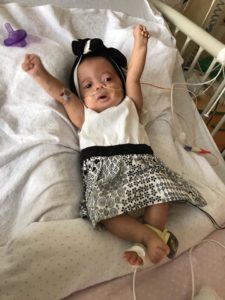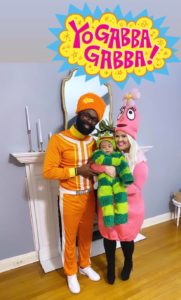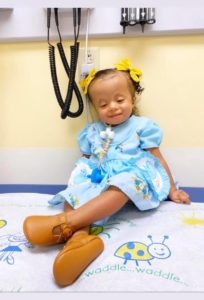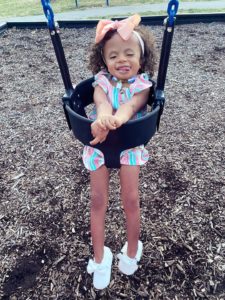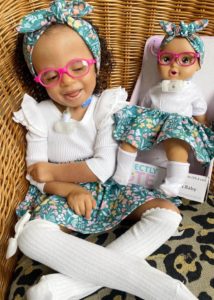Our Patients:
Lavender Watson

Rose and Demetrius Watson of St. Louis, MO were given grim odds about the survival of their unborn baby, Lavender. However, this now sassy 5-year-old, known as “The Queen”, has been proving predictions wrong every step of the way.
“Incompatible with life.” “Chromosomal abnormality”. “Might not survive long after birth”. These were words that Rose Watson heard from her obstetrician during a routine prenatal visit in 2016. “My doctor told me horror stories of what my daughter’s life would be. She told me she would send me to a hospital without a religious affiliation and schedule my D&C. In that moment I felt like I stepped outside of my body and I was watching my life instead of actually living it. I felt like I was being told that killing my baby was the only option. I didn’t care how medically imperfect she was. She was mine, and I don’t feel like it’s my place to decide when a life begins or ends. I left the office in the pursuit of a new doctor and eventually found a new OB with willingness to support our pregnancy and delivery. I was prepped that ‘comfort care’ might be the only option for Lavender following birth, so we came to terms with that possibility and hospice care was arranged. I made the decision to allow myself to feel every emotion I wanted to feel, and enjoy every single moment of this pregnancy – not allowing anyone to steal my joy. I remember one day waiting for my husband and daughter to fall asleep, and I sobbed in the middle of my living room and told God: You can use me. I will be her voice. I will stand up for life and loving beyond any earthly time limits. I will be a teacher for those who aren’t informed. I trust You,” recalls Rose.
“The remainder of my pregnancy was blissful. I had a beautiful labor and the best delivery that anyone could imagine,” says Rose. On December 27, 2016, Lavender Elizabeth was born weighing 4lbs 7oz. Her diagnosis: Trisomy 18. Since then, she has been on a mission to defy all odds and prove that she IS compatible with life.
Trisomy 18 is a chromosomal disorder affecting one in 7000 births. Most are female, and they are often born very small and frail with multiple serious health problems and physical defects. There is no cure for Trisomy 18.
“We were so excited that she was ALIVE! We had no idea what laid ahead of us. We went home with hospice in place and an attitude of gratitude. Our hospice care team seemed to be counting the days until her death, but WE were treasuring each minute of her ongoing life. When we left the hospital, we thought we might only have a few days with her, but to our surprise and joy, she just kept going. She was breathing and feeding, and doing ok, and I actually became part of a Facebook group of moms who had children with Trisomy 18. I learned that there was such a spectrum of children with this diagnosis. Some lived in the hospital and had lot of medical intervention, and others did not. For us, at least initially, things seemed to be going fairly smoothly. But on her 3 month birthday, we were finally faced with the fragile realities of her diagnosis,” says Rose.
When Lavender was 3 months old, she developed a cold. She experienced some respiratory distress, and Rose and Demetrius brought her straight to SSM Health Cardinal Glennon. When they reached the Emergency Department, a nurse immediately whisked her out of Rose’s arms to assess her breathing. She called for additional staff and there was suddenly a swarm of clinicians using language like “intubation”, “intensive care” and “tracheostomy”. “I had no idea she was in so much trouble. It was the first time she had gotten sick. Before I knew it, they were asking us if we wanted her to have a breathing tube, and prepping us to go to the Pediatric Intensive Care Unit. Neither Demetrius nor I was prepared for these decisions; we didn’t even think she would make it to delivery. But now she was 3 months old, and we were faced with losing the daughter we had grown to love, says Rose. Lavender was intubated and spent the next two weeks in the PICU. During that hospitalization, Rose and Demetrius were introduced to the Complex Care program by Dr. Aline Tanios.
Over the next 4 months, Lavender returned to the hospital multiple times. “She would get a cold and be in the hospital for two weeks. Then she would go home, get another cold and be in the hospital again for another two weeks. Each time she went, she would have to be intubated. Eventually, at 9 months of age, it became really difficult to keep doing so. During that hospitalization, an anesthesiologist had to intubate her because Lavender’s airway had simply had so much trauma. We had heard the word ‘trach’ mentioned many times over the last several months. Everything about that word was very scary to me. I wanted to be Lavender’s mom, not her nurse. The thought of having her at home with technology scared me to death, and I had so many visions in my head of how horrible that would be for her, for me, for my other daughter – our whole life,” says Rose.
“Lavender had a critical moment during that hospital stay. The decision to have her get a trach wasn’t hypothetical anymore. It was life or death. She dislodged her breathing tube and stopped breathing. The nurse called a code blue and the room was immediately full. I remember the doctor saying that she either had to get the trach or we would need to say goodbye. I was so scared of losing her. At that point I just pleaded with God and told Him I would do whatever it takes to keep her. The next morning, on 9/27 on her 9 month birthday, she got her trach,” recalls Rose.
“I will never forget the days and weeks that followed,” says Rose, “because it was almost like she was born again”. “She started smiling. She wasn’t struggling to breathe. She started eating and gaining weight. She was thriving, and letting us know she was ready to keep going. From our very first visit, the staff at Cardinal Glennon saw Lavender for what she COULD do vs. what the odds of what her diagnosis told us. We needed the hope and the honesty that Cardinal Glennon gave us. For the first few months of her life, we had been constantly holding our breath, waiting for her to die as we had been told to expect. Cardinal Glennon gave us permission and hope to see her life through a new lens. We shifted from our victim mentality of wondering why this was happening TO us, to an appreciation of what was happening FOR us,” Rose says.
“Demetrius and I knew it was going to be difficult, but I was determined to learn whatever I needed to so that we could all be home by her first birthday,” says Rose.
Despite her determination to get Lavender home, Rose admits leaning heavily on her faith. For several weeks on the Transitional Care Unit, she stayed at Lavender’s bedside learning all of the technology and care it would take to keep Lavender alive and thriving at home. “I prayed and told God that we couldn’t do it with just us. I needed supernatural strength because I was exhausted and had nothing left. How was I going to do this at home without the comfort of everyone at Glennon? I prayed, prayed, prayed, and prayed more with each day,” says Rose.
Lavender and Demetrius brought Lavender home on December 27, 2017 on the afternoon of her first birthday. Ventilator maintenance, tube feedings, suctioning, and 24 hour/day care would now be “normal”. “If you ask anyone who personally knows me if they thought that I was capable of this life they would say ‘No way!’ with absolute certainty. I’m sensitive. I’m a push-over. I’m an introvert. I turn my head when I get shots. Once we brought Lavender home, I was changing feeding tubes and trach’s. I administered meds. I managed ventilator issues. I advocated. I grew thicker skin,” says Rose.
Today, Lavender, most commonly known as the Queen, is a sassy 5-year-old – the baby Rose was told would never smile….the baby that would be a burden to her family. She is followed by multiple services including ENT, Neurology, Ophthalmology, and Pulmonology. She is part of the Complex Care program, STARS program and Footprints program. Despite her complexities, she only has 1-2 hospitalizations per year. And while she is not a typical toddler, in many ways…she is. She loves warm baths, her sissy Luella and watching mommy clean the house. She loves trips to Target, trips to Hobby Lobby, and even trips to Cardinal Glennon! “I’ve never been able to fully experience many places with her, but I love dressing her up and bringing her to Cardinal Glennon,” says Rose. “At Glennon, no one sees her as ‘different’. They are not afraid to touch her, and her trach and her tubes aren’t intimidating to anyone there. We have never felt discriminated against because of her diagnosis, and they have built up our confidence as parents,” says Rose.
Demetrius refers to “life before Lavender” and “life after Lavender”. “I am a completely different person, and see things so differently,” says Demetrius. “I didn’t have near as much compassion for people as I do now, and we are definitely more present with each other as a family. Our celebrations are frequent, and things that other people take for granted are treasured at our house,” Demetrius says. He adds, “I draw such inspiration from my wife, and I cannot imagine my life now, had I married someone else. She was our pilot from the very beginning. She learned the language, went way out of her comfort zone, and has taught us all how much strength can be found within us when we dig deep and have faith. I think before Lavender, we got in our own way from experiencing some of life’s biggest blessings. My biggest concern when Lavender was diagnosed was how MY life was going to change. Now my concern is how I can best take the gifts that I’ve been given through this journey, and help others,” says Demetrius. He adds, “Many of our friends comment that we are still so ‘normal’. I laugh because that’s simply something we have committed to for ourselves. I still work out. Rose still likes wearing make-up. We still cook, entertain and spend time with our friends. Life is what you decide to make it. It doesn’t have to end with a diagnosis, which we learned and had to practice,” says Demetrius.
“I stand taller. I’m a nurse, a doctor, a respiratory therapist, an occupational therapist, and most importantly; a Mother,” says Rose. “So, for the Mother reading this who doesn’t feel strong enough, or capable of caring for a child with significant medical needs, I’m here to tell you that you ARE. This diagnosis isn’t an end, it’s a beginning. Don’t let this break you. Celebrate every single moment. You are experiencing the greatest gift that could ever be given.”
Rose began a Facebook page dedicated to Lavender’s journey, and both she and Demetrius are writing books. Sharing their experiences has been rewarding and a labor of love. “We had no idea we’d receive so much support just for loving her (Lavender). Seeing so many people come together around her story makes us wonder what God is calling us to do. This is just the beginning, says Demetrius. “We both have a lot we want to offer others,” he says. “The baby who I was told wouldn’t live longer than two weeks is our greatest joy. She was the missing piece to our family puzzle,” says Rose, “and has truly brought the rest of US to life.”


